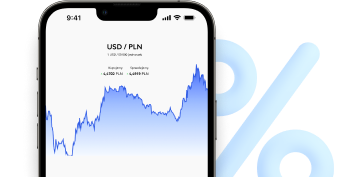Exchange rate GBP - British pound
The British pound, also known as the pound sterling, is the official currency of the United Kingdom and its dependent territories: The United Kingdom's Antarctic Territory, Falklands, Gibraltar, Guernsey, the Isle of Man, Jersey, Saint Helena and South Georgia. One British pound divides into one hundred pence.
Select currencies and check rates
Live rates.
Update: 30s
| Currency | Buy | Sell | Name | Currency code |
|---|---|---|---|---|
| GBP EUR | 1.1827 | 1.2078 | British pound | 1 GBP |
British pound exchange rate - chart
Last currency comments
Over 900 000 reviews
Customers rate us 4.9/5.0.*
Start saving today
Forget about unfavourable rates and hidden fees. See how much you can save. Create a free account and start converting currency online.
Open account for freeThe British pound
The British pound, or pound sterling, is one of the world's main and oldest currencies. Its origins date back to the 8th century AD, although it came into circulation under its proper name much later.
The British pound - where is it used?
The British pound, the GBP or sterling, is the official currency of the United Kingdom. We can also use this currency to pay in the British dependent territories such as the British Antarctic Territory, Falkland Islands, Gibraltar, Guernsey, Isle of Man, Jersey, St. Helena, South Georgia and the South Sandwich Islands. When planning a trip to one of these destinations, whether more or less exotic, it is worth checking the pound exchange rate. It should not be a problem to exchange pound sterling to local currencies in other countries, especially in Europe. The offer to buy and sell GBP is available in many exchange offices, especially at locations popular with tourists. Due to the number of people from various countries having a business relationship with the UK, exchanging pounds to euros or U.S. dollars is also very popular. This is why the GBP/USD or the GBP/EUR exchange rate is of particular interest to those coming to the country.
The history of the pound sterling
The British pound is described as the oldest currency in the world. As early as the 8th century AD, the Anglo-Saxon King Offa introduced a monetary unit made of silver called the penny, which is considered the direct ancestor of sterling. A few centuries later, King Henry II officially introduced the pound sterling, which was convertible into silver. However, the first one-pound coins appeared in 1489 and were made of gold. In 1694, the Bank of England was established to control the British currency. Shortly after that, the first banknotes began to be issued. While it is very common to refer to the British pound when describing the sterling's exchange rate (e.g. GBP/EUR), this is in fact, a colloquial name. The official name is pound sterling - it derives from the unit of mass, from where its symbol £ was derived. It is nothing but a crossed-out letter L (the cross is supposed to stand for abbreviation), originating from the Latin word libra, which means weight. A second element was also used to distinguish a monetary unit from a unit of weight - sterling. It refers to the formerly used phrase "sterling silver", which was supposed to emphasize silver quality.
The British pound - key information
The pound sterling is subdivided into 100 pence. There are 1, 2, 5, 10, 20 and 50 pence coins in circulation, as well as 1 and 2 GPB coins. 5, 10, 20 and 50 GBP banknotes are also used. In Scotland and Northern Ireland, 1- and 100-pound banknotes are also used. Their obverse currently features the image of Queen Elizabeth II. The reverse depicts figures who have distinguished themselves in British history (Winston Churchill, Jane Austen, Matthew Boulton, James Watt and others).
What determines the British pound exchange rate?
The British pound is one of the most important currencies in the world, and London is considered a global financial center. As such, the GBP exchange rate is dependent on many factors, including the British government policy, inflation, interest rates and even how analysts estimate risk in global markets. For millions of residents of the UK and their families, the most valuable information is the price of the pound to the euro or the rate of the popular currency pair GBP/EUR. Some of them try to follow the currency forecasts before arriving in their home country to exchange GBP to EUR at the most convenient time.






























